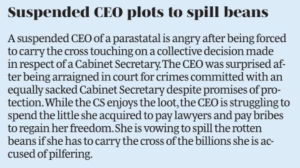News
Adhan Sheikh Abdullah, Alleged Kuria’s Conduit in Sh16B Edible Oil Scam, Appointed Member of Kenya Sugar Board

The appointment of Adhan Sheikh Abdullah as a board member of the lucrative Kenya Sugar Board has opened a Pandora’s box of an unknown figure in the murky world of state tenders.
According to controversial social media figure Maverick Aoko, Mr. Adhan allegedly played a key role in the edible oil scandal where taxpayers lost over Sh16 billion in what was described as the first corruption scandal of the Kenya Kwanza government.
Aoko claims, citing sources, that Adhan was used by Moses Kuria, who was then the Trade Cabinet Secretary, as a conduit in executing the scam. However, it is unclear how exactly he performed the alleged role. It’s common for political godfathers to keep their have clean by using others while enjoying the biggest chunk unscathed.
Perhaps for fear of further exposure, Adhan, who previously posted photos showing his opulent lifestyle on social media, soon deactivated his accounts after Aoko made the claims.
Following the edible oil scandal, Kuria was transferred from the ministry. The ripple effect of the scandal, which blew up in the public eye, saw several officials fired and arrested, including the then-CEO of the Kenya National Trading Corporation (KNTC), Pamela Mutua. According to the grapevine, Mutua had threatened not to go down alone and had vowed to take Kuria down with her, as both allegedly orchestrated the fraud.
The Edible Oil Scandal:
In 2023, the KNTC, under the guidance of then-Trade and Industry Cabinet Secretary Moses Kuria, was tasked with importing edible oils to stabilize market prices amidst rising living costs. The procurement process, however, became mired in controversy when it was revealed that select companies, allegedly with government connections, were awarded contracts without competitive bidding.
Appearing before the Senate Committee on Trade, Industrialization, and Tourism, senior KNTC officials admitted that Kenyans could have lost in excess of Sh6.6 billion in the scandal.
They admitted to spending Ksh 14.4 billion on importing the oil but were forced to sell it at a lower price, resulting in a significant financial shortfall. The companies involved in importing the oil included Multi Commerce FZC, which shipped in 1.97 million units and was paid $69.89 million (Ksh 11.18 billion); Charma Holdings Limited, which imported 499,174 jerricans and received $14.97 million (Ksh 2.39 billion); and Shehena Holdings, which brought in 13,420 units and was paid $402,600 (Ksh 64.4 million).
Peter Njoroge, the acting Managing Director of KNTC, acknowledged the loss, citing that the oil was sold at a cheaper rate due to dollar fluctuations, which fell from $160 at the time of import to $130 later. He attributed the losses to mistakes made by the former management, which cost taxpayers over Ksh 6 billion. Njoroge expressed regret, assuring the Senate that lessons had been learned and future procurement would be handled differently, including conducting transactions in Kenyan Shillings.
Purity Kimathi, KNTC’s General Manager for Finance and Business Development, informed the senators that each jerrican should have been sold for Ksh 4,813 to break even. However, they sold it for Ksh 3,700, leading to substantial losses. She pointed out additional overhead costs, such as foreign exchange losses and storage charges, that contributed to the Ksh 6.6 billion deficit.
In addition to the initial losses, it was revealed that a separate sale of uncleared jerricans at the port to Enviro Pro Kenya Limited also resulted in a Ksh 500 million loss. A total of 797,574 jerricans, originally owned by Multi Commerce, Charma Holdings, and Shehena Holdings, were sold at Ksh 3,028 per jerrican, significantly below the Ksh 3,700 price they sold to the public.
Njoroge explained that the lower selling price to Enviro Pro Kenya was due to the exemption from Value Added Tax (VAT) and the impending expiration of the oil, which was set for May of the next year. He emphasized the need to sell the oil before it expired to avoid further losses. The revelations sparked outrage among the Senate committee members, who accused KNTC of being run by criminals and called for accountability.
The Appointment to the Sugar Board:
Despite these allegations, Adhan Sheikh Abdullah’s recent appointment to the Kenya Sugar Board has raised eyebrows across the political spectrum. The appointment was announced amidst a reshuffle in state agencies, with Abdullah’s nomination seen by some as a move to reward loyalty or silence potential whistleblowers within the administration.
Incidentally, Salim Mvurya, who took over the ministry immediately after Kuria, was in hot water last year for allegedly influencing the appointment of an official implicated in the scandal to a plum post.
Ms. Lucy Anangwe was appointed managing director of the KNTC despite being implicated in the procurement scandal, which is the subject of ongoing investigations by state authorities.
Ms. Anangwe was the General Manager in charge of Strategy, Risk, and Compliance at KNTC, and her promotion came despite advice from the Chairman of the KNTC Board, Mr. Hussein Debasso.
Questions were raised as to why her former colleagues at KNTC, with whom she was involved, had been sent home but she had not.
Documents show that on November 5, 2024, CS Mvurya wrote to Mr. Debasso recommending the appointment of Ms. Anangwe as KNTC managing director to replace Ms. Pamela Mutua, who was sacked and charged in court over the edible oil scandal.
Critics argue that this appointment undermines the government’s commitment to fighting corruption, as Abdullah’s name has been associated with the edible oil scandal. His role at the Kenya Sugar Board, which oversees the regulation, development, and promotion of the sugar industry in Kenya, is seen by some as a strategic placement to influence or benefit from policy decisions in another critical sector.
Netizens have expressed concern over the implications of such appointments, suggesting that they could erode public trust in government institutions. The appointment has sparked a debate on the criteria used for selecting members of state boards, with calls for more transparent and merit-based selections rather than what appears to some as political patronage or protection.
Kenya Insights allows guest blogging, if you want to be published on Kenya’s most authoritative and accurate blog, have an expose, news TIPS, story angles, human interest stories, drop us an email on [email protected] or via Telegram
-

 Grapevine4 days ago
Grapevine4 days agoAlleged Male Lover Claims His Life Is in Danger, Leaks Screenshots and Private Videos Linking SportPesa CEO Ronald Karauri
-

 Lifestyle7 days ago
Lifestyle7 days agoThe General’s Fall: From Barracks To Bankruptcy As Illness Ravages Karangi’s Memory And Empire
-

 Americas2 weeks ago
Americas2 weeks agoEpstein Files: Bill Clinton and George Bush Accused Of Raping A Boy In A Yacht Of ‘Ritualistic Sacrifice’
-

 Business2 weeks ago
Business2 weeks agoCooking Fuel Firm Koko Collapses After Govt Blocks Sh23bn Carbon Deal
-

 Business2 weeks ago
Business2 weeks agoABSA BANK IN CRISIS: How Internal Rot and Client Betrayals Have Exposed Kenya’s Banking Giant
-

 Investigations1 week ago
Investigations1 week agoEpstein Files: Sultan bin Sulayem Bragged on His Closeness to President Uhuru Then His Firm DP World Controversially Won Port Construction in Kenya, Tanzania
-

 News1 week ago
News1 week agoAUDIT EXPOSES INEQUALITY IN STAREHE SCHOOLS: PARENTS BLED DRY AS FEES HIT Sh300,000 AGAINST Sh67,244 CAP
-

 Business1 week ago
Business1 week agoKRA Can Now Tax Unexplained Bank Deposits


















